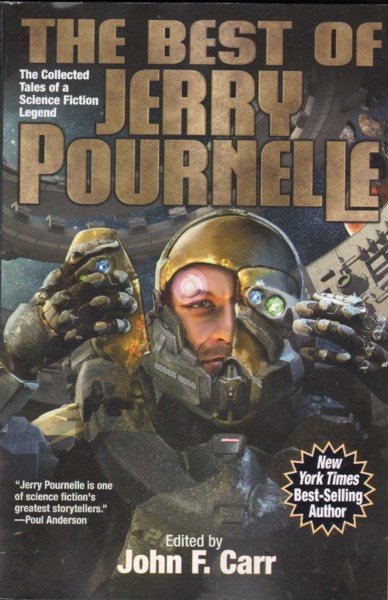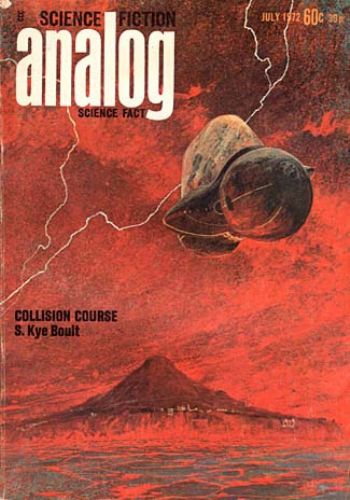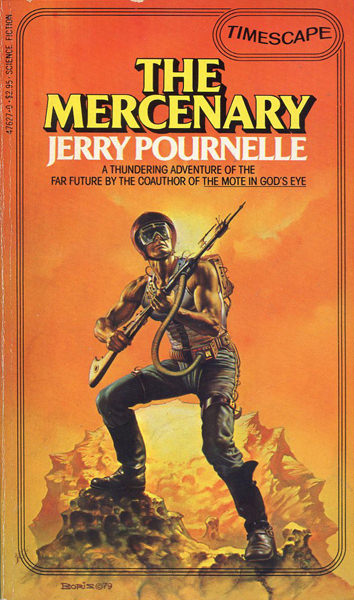 My favorite Jerry Pournelle series are the John Christian Falkenberg stories and the Janissaries books. I reread The Mercenary a few years back when I picked up a new copy at a library book sale. I had originally read it back in 1988. I knew The Mercenary was a fix up of a novella and short novel combined to make a book. I have been leisurely making my way through The Best of Jerry Pournelle the past few months. I recebtkt read the original version that appeared in Analog (July 1972).
My favorite Jerry Pournelle series are the John Christian Falkenberg stories and the Janissaries books. I reread The Mercenary a few years back when I picked up a new copy at a library book sale. I had originally read it back in 1988. I knew The Mercenary was a fix up of a novella and short novel combined to make a book. I have been leisurely making my way through The Best of Jerry Pournelle the past few months. I recebtkt read the original version that appeared in Analog (July 1972).

“The Mercenary” is part of Jerry Pournelle’s future history, specifically during the CoDominion. The CoDominion is an uneasy political deal between the United States and Soviet Union. I used to think the idea was ox manure, but realized as I get older that politics makes for strange bed-fellows.
John Christian Falkenberg, late of the CoDominion Marines, arrives on the planet Hadley. The CoDominion is pulling back as it falls apart. Planets colonized from Earth are finding themselves independent with all the attendant problems. Hadley has its share of problems. The CoDominion Marine garrison that is keeping the peace is about to pull out with Hadley’s complete independence. Falkenberg has arrived as a military consultant to create an effective planetary constabulary.
The president of Hadley is weak, vacillating, and defeatist. The Vice-President is a political opportunist of the worst sort. There is a large welfare political party with ideas that will doom the planet in a few generations.
A good part of the story is Falkenberg’s setting up a training camp using some demobilized Marines sent to Hadley as colonists as a cadre to create four battalions. Creating an army is not easy. I just read Ricardo Trota Jose’s The Philippine Army 1934-1942 and the difficulties on creating an army without adequate (and competent) officers and NCOs.
The CoDominion pulls out of Hadley and the Freedom Parties minions riot. President Budreau leaves the planet, Falkenberg’s aid shoots the Vice-President, and the head of the engineers is made temporary president. Falkenberg puts down the uprising in a sports stadium. It uses Belisarius’ crushing of the Nika revolt in Constantinople in 532 A.D. at the Hippodrome. Some volleys are sent into the crowd while sharp-shooters take out the leaders.
The story ends with Falkenberg taking the first battalion made up of marines with him as freelancers. The 2nd and 3rd battalions remain as the planetary constabulary. The fourth battalion had been made up on political adherents of Vice-President Bradford. That battalion was severely depleted in street fighting before the move to the stadium.
I have read some retreat from empire stories before. Lester del Rey’s “Shadows of Empire” and C. L. Moore’s “There Shall Be Darkness.” Those were more poetic. Pournelle shows the dark underbelly and political chaos common with decolonization in the 1950s and 60s.
The story is sent on another planet with the political dissolution of the CoDominion. This story could easily be refitted with a section of North America finding itself independent as the United States breaks up. The current times adds some relevance to “The Mercenary.”

This book and H.Beam Piper’s Lord Kalvan of Otherwhen started my life-long interest in military history. I read them both in the same week and I was off and running. It was in The Mercenary that I first read Montrose’s Toast:
He either fears his fate too much or else his desserts are small,
Who dares not put it to the touch, to win or lose it all!
Wish you were still with us, Dr. Pournelle.
I remember this story. The bit that most stands out in my memory is when, after the slaughter in the stadium, the politicians are hailing Falkenberg as their savior. He turns on them savagely and tells them that he has NOT saved them, he has just bought them time to save themselves. If they can.
An unusually realistic ending.
I loved that book – had the orange Vallejo cover. Still do. The first story was of course inspired by the Nika revolt, and many of the Falkenberg stories were based on actual events. One reason I came to love history was Pournelle, not my teachers.
Baen eventually released a compendium that had all the Falkenberg stories through “go tell the spartans”, IIRC.